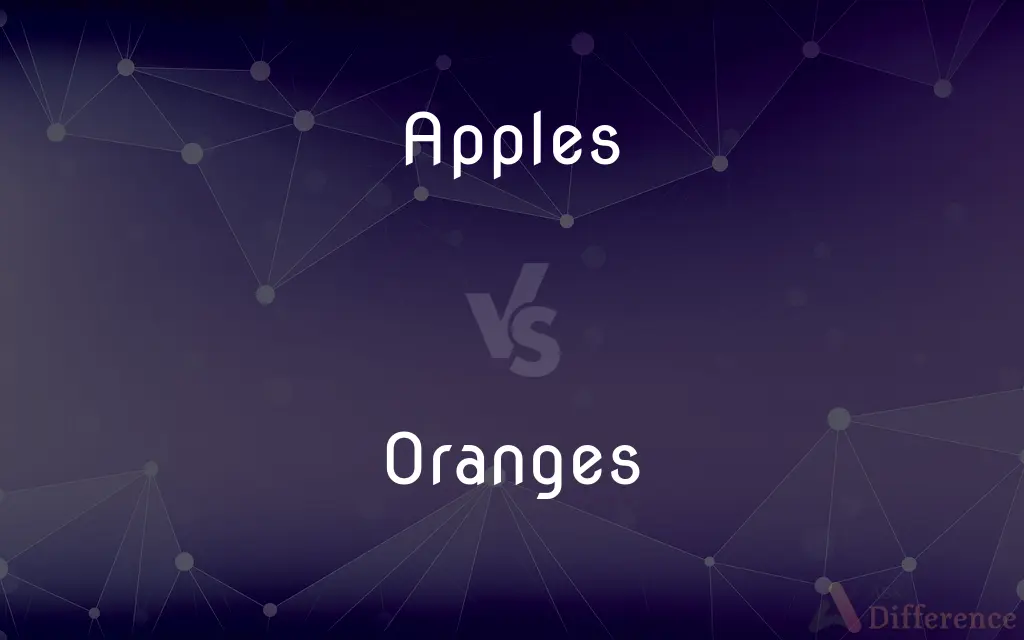Apples vs. Oranges — What's the Difference?
By Tayyaba Rehman — Updated on October 3, 2023
Apples are typically round, crisp fruits with a thin skin, while oranges are citrus fruits with a thicker, pebbly skin and segmented inside.

Difference Between Apples and Oranges
Table of Contents
ADVERTISEMENT
Key Differences
Apples and oranges are two of the most popular fruits worldwide, but they are distinct in various ways. Apples, known for their crisp texture, come in shades ranging from green to red. They grow in temperate climates and have been a staple in diets for centuries. Oranges, on the other hand, are juicy citrus fruits known for their sweet-tart flavor and bright orange hue.
While apples are often associated with cool weather and autumn harvests, oranges thrive in warmer, subtropical climates. Apples have a thin skin that can be eaten, and they're often consumed raw, though they're also used in various culinary dishes from pies to sauces. Oranges, with their thicker, pebbly skin, are typically peeled before consumption, revealing juicy segments inside.
Culturally, apples are often associated with education and knowledge, as in the phrase "an apple for the teacher." Oranges, conversely, are linked with health and vitality, with orange juice being a breakfast staple for many.
Comparison Chart
Type
Pome fruit
Citrus fruit
Skin Texture
Thin, smooth
Thick, pebbly
ADVERTISEMENT
Taste
Sweet to tart
Sweet-tart
Climate
Temperate
Subtropical
Usage
Often eaten raw, used in desserts
Juiced, eaten raw, used in various dishes
Compare with Definitions
Apples
Fruits often linked with education and knowledge.
Giving apples to teachers is an old tradition.
Oranges
Require a subtropical climate for growth.
Florida is famous for its oranges.
Apples
A pome fruit with a thin skin, coming in various colors.
Apples are often used in baking delicious pies.
Oranges
Fruits with a thick, pebbly outer skin.
Peeling oranges can be a messy task.
Apples
Commonly used in desserts and sauces.
Applesauce is a favorite among children.
Oranges
A citrus fruit known for its juicy segments.
Oranges provide a refreshing burst of juice.
Apples
A popular fruit associated with autumn harvests.
Apples are plentiful during the fall season.
Oranges
Commonly associated with health and vitality.
A glass of orange juice is a morning staple for many.
Apples
Typically round fruits with seeds in the core.
She sliced the apples and removed the core.
Oranges
Used in various dishes from salads to desserts.
Orange zest adds a bright flavor to baked goods.
Apples
A cultivated deciduous tree (Malus domestica or M. pumila) in the rose family, native to Eurasia and having alternate simple leaves and white or pink flowers.
Oranges
Any of several evergreen trees of the genus Citrus of Southeast Asia, widely cultivated in warm regions and having fragrant white flowers and round fruit with a yellowish or reddish rind and a sectioned, pulpy interior, especially the sweet orange and the bitter orange.
Apples
The firm, edible, usually rounded fruit of this tree.
Oranges
The fruit of any of these trees, having a sweetish, acidic juice.
Apples
Any of several other plants, especially those with fruits suggestive of the apple, such as the crabapple or custard apple.
Oranges
Any of several similar plants, such as the Osage orange and the mock orange.
Apples
The fruit of any of these plants.
Oranges
The hue of that portion of the visible spectrum lying between red and yellow, evoked in the human observer by radiant energy with wavelengths of approximately 590 to 630 nanometers; any of a group of colors between red and yellow in hue, of medium lightness and moderate saturation.
Apples
Plural of apple
Oranges
Of the color orange.
Apples
(Cockney rhyming slang) Stairs. apples and pears
Oranges
Made from oranges.
Apples
(slang) Testicles.
Oranges
Tasting or smelling like oranges.
Apples
Nice, fine.
Oranges
Plural of orange
Common Curiosities
Can you eat the skin of both apples and oranges?
While apple skins are commonly eaten, orange skins are typically discarded due to their thick and bitter nature.
Are apples and oranges related fruits?
No, apples are pome fruits, while oranges are citrus fruits.
Which has more vitamin C, apples or oranges?
Oranges are generally higher in vitamin C compared to apples.
Which fruit is more acidic, apples or oranges?
Oranges are more acidic than apples.
Why do apples turn brown when cut?
Apples undergo enzymatic browning when exposed to air.
What is the most popular apple variety?
Varieties like Red Delicious and Granny Smith are among the most popular.
Are there green oranges, like there are green apples?
Some oranges can be green when ripe, but it's due to chlorophyll and not variety.
Can apples and oranges be grafted together?
While experimental grafts exist, they are not commonly successful or practical.
How do apples and oranges pollinate?
Apples typically require cross-pollination, while many oranges are self-fertile.
Why is comparing unrelated things called "comparing apples to oranges"?
The phrase emphasizes the distinct differences between the two items being compared.
How long is the shelf life of apples and oranges?
While it varies, apples can last a few weeks when refrigerated; oranges last about 1-2 weeks.
What are the health benefits of apples and oranges?
Both are rich in fiber and vitamins, with oranges being an excellent source of vitamin C and apples being linked to heart health.
Can you cook with both apples and oranges?
Yes, both fruits can be used in a variety of dishes, from baked goods to savory meals.
Which fruit is juicier, apples or oranges?
Oranges are typically juicier than apples.
What are blood oranges?
Blood oranges are a variety with red-tinted flesh and a unique berry-like flavor.
Share Your Discovery

Previous Comparison
Phd vs. Doctorate
Next Comparison
Ill vs. PoorlyAuthor Spotlight
Written by
Tayyaba RehmanTayyaba Rehman is a distinguished writer, currently serving as a primary contributor to askdifference.com. As a researcher in semantics and etymology, Tayyaba's passion for the complexity of languages and their distinctions has found a perfect home on the platform. Tayyaba delves into the intricacies of language, distinguishing between commonly confused words and phrases, thereby providing clarity for readers worldwide.














































